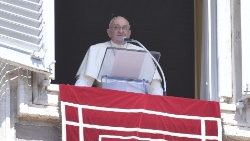Pope at Regina Coeli: Hear and follow the Lord, our Good Shepherd
By Thaddeus Jones
In his catechesis before leading the recitation of the Regina Coeli on the Fourth Sunday of Easter, Pope Francis recalled how today's liturgy speaks about the Lord who uses "the tender and beautiful image of the shepherd who stays with the sheep." The Lord's sheep "hear" his voice, they "know" him, and they "follow" him.
Hear, know, follow
The three verbs - hear, know, follow - illustrate the key message in today's Gospel reading, said the Pope. The sheep "hear" the voice of the shepherd, showing how the initiative comes from the Lord and his grace who calls us to communion, the Pope explained, but this requires us to be available and open to this invitation and relationship. Today we can often be overhwelmed with work, families, and personal siutations the Pope acknowledged, but we must stop to listen, to hear the Word of the Father like a listening child, curious and with open hearts that allow us to be in communion with the Lord and our brothers and sisters.
The Lord knows his sheep
By listening to Jesus we discover "he knows us," the Pope explained, and in the biblical sense knowing means loving - the Lord knows about us and our inner being, inside and out. Jesus seeks our friendship, trust, love and intimacy, the Pope went on to say, and to help us understand and accept the marvelous reality that "we are always loved by him" and never alone.
The Lord sustains us in our suffering, difficulties and crises, times in particular we can discover "we are known and loved by the Lord," said the Pope. He suggested we ask ourselves if we allow the Lord into our lives and if we share with him all our trials and tribulations, so we can experience his closeness, compassion and tenderness as our Good Shepherd.
Follow the Good Shepherd
Finally, the Pope focused on the verb "follow," as the Lord's followers go where he goes along the same path and direction. Like the Good Shepherd, they seek those who are lost or need our compassion and love.
The Pope said we need to ask ourselves if we allow Jesus only to love ourselves, or if we have taken the next step to imitate the Lord and reach out to our brothers and sisters, as the Lord reaches out to us. May the Blessed Mother "help us listen to Christ, know him always more and follow him on the way of service."
Thank you for reading our article. You can keep up-to-date by subscribing to our daily newsletter. Just click here





